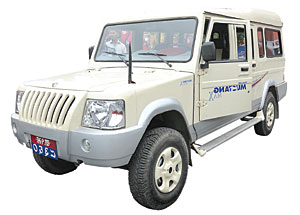 BIKRAM RAI |
The roads in Kathmandu may have reached saturation point, there may be periodic fuel shortages, but all that doesn't seem to deter people from investing in cars.
Nepal's roads and highways have vehicles from all over the world, even Nepali made Mustangs and Safa Tempos, jostling for space with motorcycles, bicycles, rickshaws, push carts, cattle, dogs and monkeys.
"The fact that so many automobile brands have been able to establish themselves here says a lot about the market," says Deepak Agrawal of Morang Auto Works, which distributes Skoda. "Owning a vehicle used to be a luxury, but now it has become a necessity."
Indeed, the customer profile for cars is no longer limited to the rich and newly rich. Customers are as diverse as the models available.
The positive sales graph for entry-level cars indicates that many motorcycle owners are moving up the market. And those who already own a car are looking for new models. Competition is fierce, so it's a buyer's market in terms of choice of quality, features, style, and price. Car dealers are looking to sweeten deals by providing good after-sale service, including through warranties, bank loans, free servicing and exchange facilities.
It fact, it was easy loans from banks and finance companies that created the boom in the auto market five years ago. However, the banking crisis and the general slowdown in the economy has affected sales.
"But the last few months have been a bit slow," admits Bardan Basnet of Agni Incorporated that distributes Mahindra. "The liquidity crunch hit not just the financial market but other industries like us who are dependent on it."
But with Dasain around the corner, dealers are hoping that the market will pick up. "Sales has been slow," says Rupesh Sharma Bhatta of Laxmi Intercontinental that sells Hyundai. "But we can expect the market to expand."
An indication of this faith in the market is an eagerness to bring in new models. "We recognise the potential of the market," says Alok Joshi of Batas Brothers Motos, which recently relaunched Fiat in Nepal. "We are not short-term players and understand that as soon as the political and financial environments improve, the market will pick up."
The automobile industry contributes 25 per cent of Nepal's import duty revenues to the state's coffers because of the staggering 238 per cent tax on vehicles which is comparable to Singapore. Considering the demand for automobiles, the expansion of Nepal's road network, this is not likely to go down.
Says Honda's distributor for Nepal and the head of NADA, Saurabh Jyoti: "What we want is for these duties to translate into infrastructure development, people will buy but the roads have to be expanded and improved to sustain the growth in the number of vehicles."
Paavan Mathema
Read also:
...and what about the roads...
"Re-invest auto tax on improving infrastructure"
NADA AUTO SHOW
7-11 September Bhrikuti Mandap Exhibition Hall, Kathmandu
 |
D-5 H H & Company
G-13 Continental Associates
G-10 Bama Motors
A-1 Syakar Company
G-9 Nemlink International Traders
H-11 Leon Motors
A-22 Sipradi Trading
F-15 Morang Auto Works
I-6 Laxmi Intercontinental
E-17 Batas Brothers Motors
F-16 GO Automobiles
J-9 Ganesh Enterprises
N-1 Syakar Company
R-1 Agni Incorporate
R-6 Vijay Motors
R-3 Pooja International Nepal
J-13 Constant Business Group


